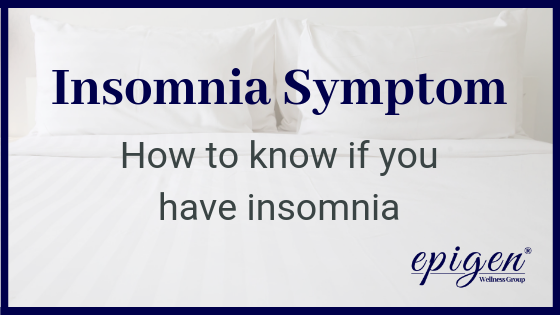Insomnia is defined as having ONE OR MORE of the following symptoms of insomnia:
- Difficulty falling asleep – taking 15 minutes or more to fall asleep
- Difficulty staying asleep – waking at night and not returning to sleep within seconds
- Waking up too early – naturally waking before 8 hours of quality sleep
- Not feeling refreshed and energized throughout the day
There are different types of insomnia, and yes, it is possible to suffer from multiple types at the same time. Initiation insomnia is difficulty falling asleep, and defined as taking 15 minutes or more to fall asleep.
Maintenance insomnia is difficulty staying asleep. Sleep goes in cycles, and it is okay to wake up between cycles. In this case, it should be quick. For example, you roll over and go right back to sleep. Waking up before a cycle completes is a bigger issue.
Restoration insomnia is when there are insomnia symptoms such as daytime drowsiness, brain fog, and fatigue, even after consistently getting full nights of sleep. This can happen when there is no difficulty falling asleep or staying asleep.
Here are some red flags of concern (aka insomnia symptoms):
- Waking up multiple times per night – even if it is to use the restroom (more on that later)
- Not returning to sleep within seconds
- Thinking about anything (the previous day, your to-do list, upcoming plans…) before going back to sleep
You may be wondering why this is such a HUGE issue. Well, the most important and restorative stages of sleep are at the end of the cycle (stage 3, formerly known as stages 3 & 4, and REM). If your sleep is restless, you may not be going through all stages of sleep, and missing out on the crucial end of each cycle. You may not even be aware of restless sleep, or a potential problem of insomnia, without the more well-known insomnia symptoms.
Here are some signs to consider:
- A bed partner has told you about restlessness – shifting, kicking, rolling, blanket stealing, pillow throwing
- Your blankets are messy when you wake up
- You wake up with head, neck, or back pain
- You wake up feeling tired
- You get tired later in the day – even if you feel fine when you wake up
If any of the scenarios listed above sound a little too familiar, you’re in the right place. There are plenty of natural, scientifically-proven steps you can take to get your sleep back on track.
Here are some things you can do now to break the cycle of poor sleep:
- Try to notice any potential symptoms of insomnia.
- Follow us on Facebook for “Quick Tips” to consistently sleep well.
- Start tracking your sleep – record the times you go to bed at night and wake up in the morning, how many times you wake up at night, how long it takes you to fall asleep and return to sleep, and how you feel in the morning.
- Grab your FREE guide to sleep better tonight.

